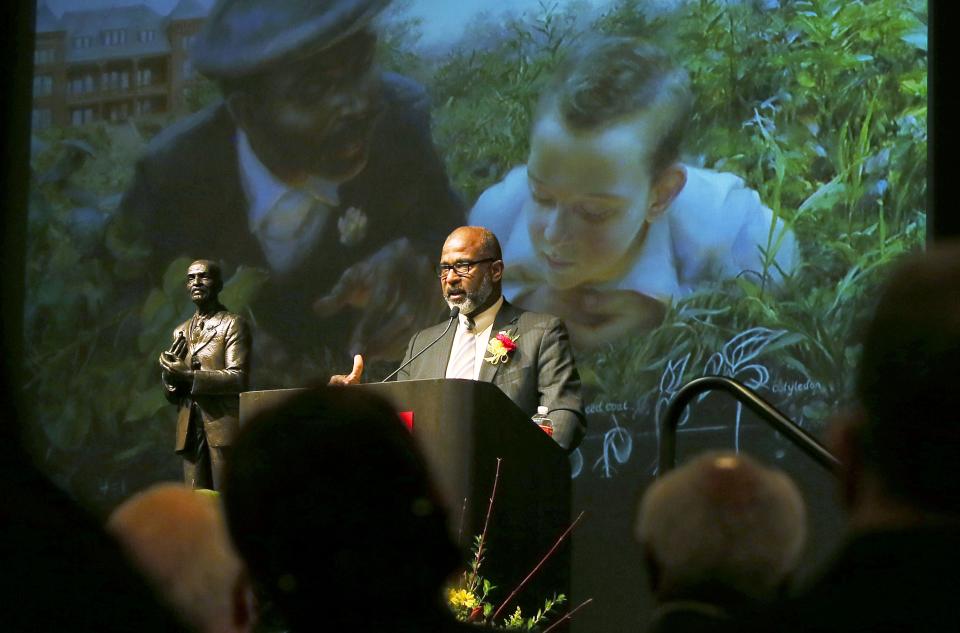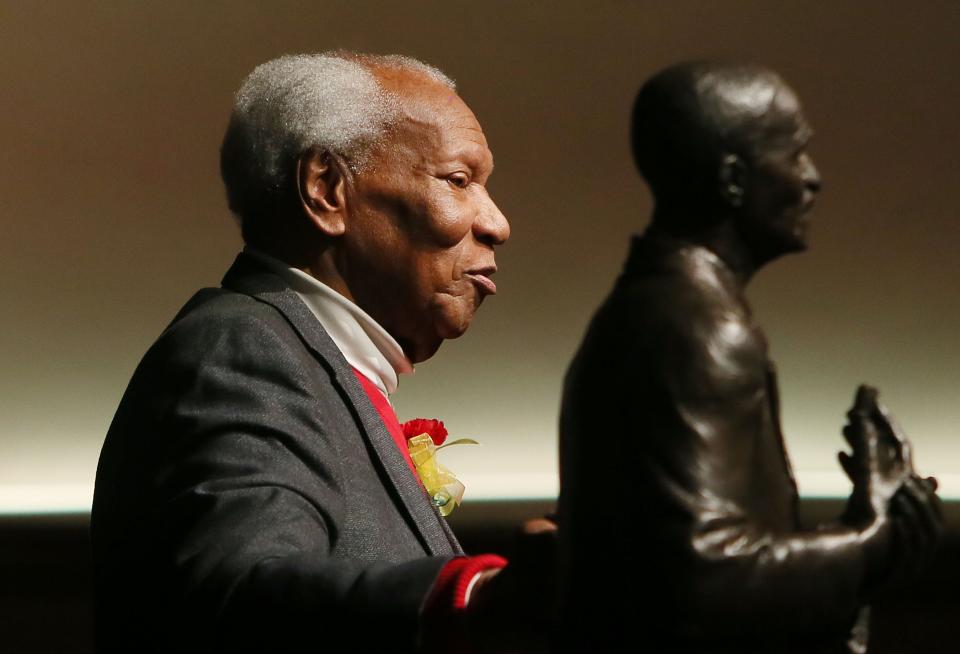Ag innovator celebrated for humanity, wisdom on Iowa's first George Washington Carver Day
- Oops!Something went wrong.Please try again later.
- Oops!Something went wrong.Please try again later.
For the inaugural George Washington Carver Day in Iowa, the community celebrated the life and legacy of the Iowa State University alum and scientist who revolutionized agricultural practices.
Iowa State held a celebration Wednesday at Memorial Union that featured remarks from officials with ties to Carver's past and legacy, and food inspired by Carver's work including sweet potato and avocado bites, peanut butter and plum tea sandwiches and sweet potato and caramelized onion flatbread.
The celebration was as much about his life as it was his legacy.
Carver was born enslaved around 1864 in Diamond, Missouri. He was freed by the end of the Civil War, but he and his family were subjected to continued physical violence and segregation by white society.
Carver did find welcome in Iowa, however, where he first studied art and piano at Simpson College before he moved to Iowa State to study agriculture. He became Iowa State's first Black student and, later, its first Black faculty member. He eventually moved his research to what was then the Tuskegee Institute in Alabama.

His discoveries in making products from crops such as peanuts and sweet potatoes, and practices including crop rotation in fields earned him monikers such as "Peanut Man" and "Plant Doctor." But in his own words — his mission was "to help the farmer and fill the poor man's dinner pail."
"'It is simply service that measures success,'" said Paxton Williams as he quoted Carver from the stage.
Williams, a former Iowa assistant attorney general who now is a lawyer for a private firm, said he's long studied and worked to preserve Carver's legacy. Iowa State's President Wendy Wintersteen credited Williams with being an evangelist for Carver.
More:From the 1st George Washington Carver Day to a blues show, how to celebrate Black History Month
Feb. 1, 2023 was the first George Washington Carver Day in Iowa
Carver is now one of only three people the state of Iowa recognizes each year with their own day — the other two are former U.S. President Herbert Hoover and Nobel Peace Prize Laureate Norman Borlaug.
Feb. 1, 2023, was the first George Washington Carver Day in Iowa after the Legislature and Gov. Kim Reynolds approved it last year.
Kenneth Quinn, former U.S. ambassador to Cambodia and former president of the World Food Prize Foundation, said Wednesday that Carver will forever have his "rightful place in the pantheon of Iowa's greatest agricultural and humanitarian heroes."
Quinn and Simon Estes, an internationally-acclaimed opera singer, together led the initiative to bring about Carver's day of recognition, starting with an Op-Ed in the Des Moines Register in the days after law enforcement killed George Floyd in Minneapolis.
Quinn and Estes wrote that Carver's story and honoring has the power "to help heal the open wound of racism that is now so bitterly and painfully afflicting our country," a pain "still so intensely felt by such a large part of our population that is affected by the racism that still afflicts our country more than 150 years after George Washington Carver came to Iowa."

Olga Bolden-Tiller, the dean of present-day Tuskegee University College of Agriculture, reminded the audience of more violence against people of color, noting the celebration of Carver was the same day as the funeral of Tyre Nichols, a Black man who died after police beat him in Memphis, Tennessee.
Bolden-Tiller cited a quote from Carver: "Resolve to be tender with the young, compassionate with the aged, sympathetic with the striving, and tolerant of the weak and the wrong. Sometime in life you will have been all of these.”
Dewayne Goldmon, an Iowa State alum and senior advisor for racial justice and equity with the U.S. Department of Agriculture, said Carver turned down lucrative offers to leave his lab in Tuskegee and do research elsewhere.
"He wanted to stay and help his people," but he also shared his discoveries with all people, Goldmon said.
Estes said Carver would probably want all people to try harder to learn "to be more loving towards one another."
"We can't forget history" for it's how we learn to not make the same mistakes again, Estes said. He called on people to live as Carver did — love each other, God, science, knowledge and "above all to love wisdom" and put that love into action.
More:What kids of all ages should be reading for Black History Month (and all year)
Celebration was the first of Black History Month events at Iowa State
Iowa State will explore other topics including Black history on college campuses, the role of African American cuisine in American history and violence against Black people during its events throughout Black History Month.
Lawrence Ross, a writer and lecturer known for his research on Black Greek life culture, will speak at 7:30 p.m. Feb. 22 in the Memorial Union's Great Hall to give a lecture titled "Blackballed: The Black and White Politics of Race on Campus."
Jessica Harris, an author, editor and translator of 18 books including 12 cookbooks that document cuisine of the African diaspora, will give a lecture at 6 p.m. Feb. 27 in the Memorial Union's Great Hall titled "High on the Hog: How African American Cuisine Transformed America." There is a Netflix series named after her book "High on the Hog."
Patrick Phillips will deliver a lecture at 6 p.m. March 2 in the Memorial Union's Great Hall titled "Blood at the Root: A Discussion of Forsyth County, Georgia" that will look at his hometown's history of arson, lynching and mob violence against its Black residents, who were driven out by a white mob in 1912.
Those lectures are in addition to arts and entertainment activities and performances. More information about the university's Black History Month events is available at news.iastate.edu/news/2023/01/31/blackhistorymonth2023.
Phillip Sitter covers education for the Ames Tribune, including Iowa State University and PreK-12 schools in Ames and elsewhere in Story County. Phillip can be reached via email at psitter@gannett.com. He is on Twitter @pslifeisabeauty.
This article originally appeared on Ames Tribune: Life, legacy celebrated on Iowa's first George Washington Carver Day

